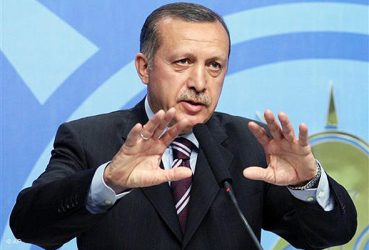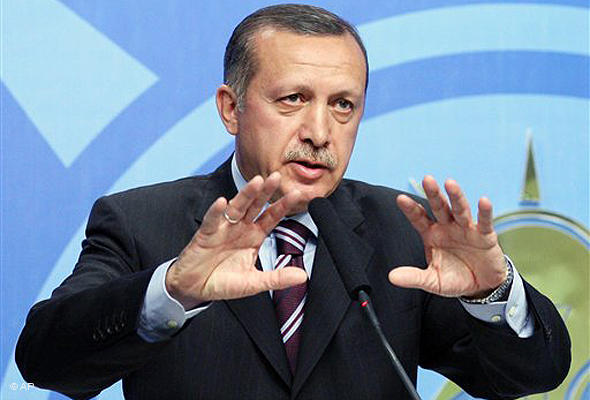Ιράκ
, Κουρδιστάν (Κουρδικό Ζήτημα, Αμπντουλλάχ Οτζαλάν)
, Συρία
8 Απριλίου 2013
FT: Ο Ερντογάν σχεδιάζει να εντάξει τους Κούρδους της Συρίας και του Ιράκ στην (sic) Τουρκόσφαιρα

Ankara pulls at Mideast’s Kurdish thread
By David Gardner
Erdogan plans to draw Iraq’s and Syria’s Kurds into the ‘Turkosphere’, writes David Gardner
 In 10 years as Turkey’s prime minister, Recep Tayyip Erdogan, at times reliably unscripted and unpredictable, has attracted his fair share of brickbats. But not last week when, buried in bouquets of praise, he started decisively down the road topeace with Turkey’s Kurds.
In 10 years as Turkey’s prime minister, Recep Tayyip Erdogan, at times reliably unscripted and unpredictable, has attracted his fair share of brickbats. But not last week when, buried in bouquets of praise, he started decisively down the road topeace with Turkey’s Kurds.On Kurdish new year, or Newroz, Abdullah Ocalan, jailed leader of the outlawed Kurdistan Workers’ party (PKK), called a truce in its 29-year war against the Turkish state, after a delicate negotiation with Mr Erdogan’s most trusted aides.
This process is a high-risk strategy to address a tangled story, with tactics that appear inconsistent and policy signals that will look contradictory. The reward for Turkey if it works is potentially enormous.
But so too are the implications for a Middle East in turmoil, whose national borders are facing their severest test since Britain and France dismembered the Ottoman Empire’s Arab provinces nearly a century ago to fit their imperial needs. It is not too much of an overstatement to suggest that Mr Erdogan may be pulling on a (Kurdish) thread that could unravel frontiers across the region.
The immediate focus will be on the essentials of a deal with Turkey’s estimated 15m Kurds, and whether a republic built on the ethnic nationalism of Mustafa Kemal Ataturk can satisfy the minimal demands of a minority whose distinct language and culture it has only recently begun to acknowledge.
Close observers believe things have changed. “There is a maturity about the Kurdish question that was not present 10 years ago,” says Hugh Pope of the International Crisis Group. Mr Erdogan, his close aides say, believes Mr Ocalan – demonised for decades by state propaganda – wants to end the war.
In exchange for the PKK standing down, a deal would require: reform of anti-terror laws that criminalise opinion (and jail thousands of Kurdish political activists); replacement of ethnic references in the constitution with equal citizenship; equality for the Kurdish language in education and public life; devolution of some power, probably through a broad decentralisation of Turkey; lowering of the electoral threshold to enter parliament, currently at 10 per cent, which prejudices Kurdish parties.
There will also have to be a formula to release Kurdish prisoners and exiles (including the reviled Mr Ocalan), and a reconciliation process to establish the truth about a dirty war that has cost about 40,000 lives.
All this requires not just cultural change but almost doctrinal revolution, and Mr Erdogan’s aides warn that the prime minister will continue to seem unpredictable, if only to keep at bay the wolves of Turkish nationalism.
But what seems to have set Mr Erdogan on this course – from which he at least once before pulled back – is the accelerating disintegration of Syria in the chaotic uprising next door against Bashar al-Assad.
Last summer, an Assad regime under intense rebel pressure abandoned its north-eastern border with Turkey to Syrian Kurdish forces, in effect presenting the Turks with another Kurdish entity to their south, alongside the autonomous Kurdistan Regional Government in northern Iraq. Faced with a possible confederation of Kurdish territories – and north-eastern Syria run by a PKK proxy – Ankara is trying to turn a liability into an asset.
On the face of it, Mr Erdogan’s tactics do not add up to a strategy. He is trying to limit concessions to Turkey’s Kurds, while strengthening ties with Iraqi Kurds who have a proto-state. Having fostered close economic ties with northern Iraq, he is now siding with the KRG in its gradual assertion of sovereignty over the Kurdish region’s oil and gas deposits, which pushes in the direction of Iraqi Kurdistan’s secession from Baghdad.
The government of Nouri al-Maliki, a Shia Islamist, has defaulted on a federal formula for governing Iraq that includes Kurds and the Sunni Arab minority, and Iraqi Kurdistan has most of the attributes of an independent state (including an army). Syrian Kurdistan is aiming at some form of home rule. But Ankara is offering Turkish Kurds rights that fall well short of autonomy. So is Mr Erdogan riding a tiger?
Not if his long game is to upholster a minimalist deal at home by bringing Iraq’s and Syria’s Kurds into Turkey’s sphere of influence. Pan-Kurdish desire for a state would be sublimated inside a prosperous “Turkosphere” – two nations for one state fired by economic integration (and maybe some Iraqi oil and gas). The mainly Sunni Turks and Kurds would stand shoulder-to-shoulder facing Shia powers from Tehran, through Baghdad to Damascus.
While that might resolve the Kurdish question, it could catapult the region back to the Ottoman geography of Mesopotamia and Greater Syria (which included Lebanon, Palestine and Jordan). The ignominious Franco-British stitch-up – the Sykes-Picot agreement of 1916 – could come apart. Mr Ocalan’s farewell to arms letter rails against “artificial borders”. He sets his compass by Anatolia and Mesopotamia. At some point we will learn what course Mr Erdogan has set.
[email protected]

 Ακολουθήστε το
Ακολουθήστε το